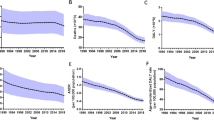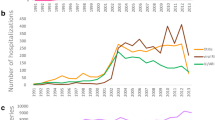Abstract
Purpose
To investigate perinatal outcomes and long-term infectious morbidity in children of mothers with familial Mediterranean fever (FMF).
Methods
A population-based cohort study comparing perinatal outcomes and long-term infectious morbidity of offspring of mothers with and without FMF was conducted. All singleton deliveries between the years 1991–2021 in a tertiary medical center were included. The study groups were followed until 18 years of age for long-term infectious morbidity. A Kaplan–Meier survival curve was used to compare the cumulative incidence of long-term infectious morbidity, and generalized estimation equation (GEE) models as well as Cox proportional hazards models were constructed to control for confounders.
Results
During the study period, 356,356 deliveries met the inclusion criteria. 411 of them were women with FMF. The mean follow-up period interval was 9.7 years (SD = 6.2) in both study groups. Using GEE models, preterm delivery, cesarean delivery, and low birth weight were independently associated with maternal FMF. The total infectious-related hospitalization rate was significantly higher in offspring born to mothers with FMF compared to the comparison group (Kaplan–Meier survival curve, log-rank p < 0.001). Using a Cox proportional hazards model, controlling for gestational age, maternal age, diabetes mellitus, cesarean delivery, and hypertensive disorders, being born to a mother with FMF was found to be an independent risk factor for long-term infection-related hospitalization of the offspring.
Conclusion
Maternal FMF was found to be independently associated with long-term infection-related hospitalization of the offspring. This positive correlation may reflect an intra-uterine pro-inflammatory environment which may result in the offspring's long-term susceptibility to infection.

Similar content being viewed by others
Data availability
The data supporting this study’s findings are available from the corresponding author upon reasonable request. Restrictions apply to the availability of these data due to participant confidentiality.
References
Sönmezgöz E, Özer S, Gül A, Yılmaz R, Kasap T, Takcı Ş, Gümüşer R, Demir O (2019) Clinical and demographic evaluation according to MEFV genes in patients with familial Mediterranean fever. Biochem Genet 57(2):289–300. https://doi.org/10.1007/s10528-018-9889-y
Bakkaloglu A (2003) Familial Mediterranean fever. Pediatr Nephrol 18:853–859. https://doi.org/10.1007/s00467-003-1185-2
Dotters-Katz S, Kuller J, Price T (2012) The impact of familial Mediterranean fever on women’s health. Obstet Gynecol Surv 67:357–364. https://doi.org/10.1097/OGX.0b013e318259ed3a
Yildirim ME, Kurtulgan HK, Ozdemir O, Kilicgun H, Aydemir DS, Baser B, Sezgin I (2019) Prevalence of MEFV gene mutations in a large cohort of patients with suspected familial Mediterranean fever in Central Anatolia. Ann Saudi Med 39:382–387. https://doi.org/10.5144/0256-4947.2019.382
Varan O, Kucuk H, Babaoglu H, Atas N, Salman RB, Satis H, Ozturk MA, Haznedaroglu S, Goker B, Tufan A (2019) Effect of interleukin-1 antagonists on the quality of life in familial Mediterranean fever patients. Clin Rheumatol 38:1125–1130. https://doi.org/10.1007/s10067-018-4384-8
Keriakos R, Roberts JK, Sidra L (1999) Familial Mediterranean fever in a pregnant woman. J Obstet Gynaecol 19:541–542. https://doi.org/10.1080/01443619964445
Ofir D, Levy A, Wiznitzer A, Mazor M, Sheiner E (2008) Familial Mediterranean fever during pregnancy: an independent risk factor for preterm delivery. Eur J Obstet Gynecol Reprod Biol 141:115–118. https://doi.org/10.1016/j.ejogrb.2008.07.025
Mazor-Dray E, Levy A, Schlaeffer F, Sheiner E (2009) Maternal urinary tract infection: is it independently associated with adverse pregnancy outcome? J Matern Fetal Neonatal Med 22:124–128. https://doi.org/10.1080/14767050802488246
Sacks G, Sargent I, Redman C (1999) An innate view of human pregnancy. Immunol Today 20:114–118. https://doi.org/10.1016/s0167-5699(98)01393-0
Dan N, Sheiner E, Wainstock T, Marks K, Kessous R (2021) Maternal smoking during pregnancy and the risk for childhood infectious diseases in the offspring: a population-based cohort study. Am J Perinatol 38:166–170. https://doi.org/10.1055/s-0039-1695773
Gutvirtz G, Wainstock T, Landau D, Sheiner E (2019) Maternal obesity and offspring long-term infectious morbidity. J Clin Med 8:1466. https://doi.org/10.3390/jcm8091466
Cohen R, Gutvirtz G, Wainstock T, Sheiner E (2019) Maternal urinary tract infection during pregnancy and long-term infectious morbidity of the offspring. Early Hum Dev 136:54–59. https://doi.org/10.1016/j.earlhumdev.2019.07.002
Nae B, Wainstock T, Sheiner E (2022) The significance of maternal asymptomatic bacteriuria during pregnancy on long-term offspring infectious hospitalizations. J Dev Orig Health Dis 13:508–513. https://doi.org/10.1017/S2040174421000593
Park YH, Wood G, Kastner DL, Chae JJ (2016) Pyrin inflammasome activation and RhoA signaling in the autoinflammatory diseases FMF and HIDS. Nat Immunol 17:914–921. https://doi.org/10.1038/ni.3457
Nabil H, Zayed A, State O, Badawy A (2012) Pregnancy outcome in women with familial Mediterranean fever. J Obstet Gynaecol 32:756–759. https://doi.org/10.3109/01443615
Yasar O, Iskender C, Kaymak O, Taflan Yaman S, Uygur D, Danisman N (2014) Retrospective evaluation of pregnancy outcomes in women with familial Mediterranean fever. J Matern Fetal Neonatal Med 27:733–736. https://doi.org/10.3109/14767058.2013.837446
Iskender D, Kara O, Ozturk Kaymak A, Daglar HK, Kirbas A, Iskender CT, Kaymak O, Celen S (2020) Association between basal proteinuria levels and pregnancy outcomes in familial Mediterranean fever. J Obstet Gynaecol 40:1102–1105. https://doi.org/10.1080/01443615.2019.1700944
Rabinovitch O, Zemer D, Kukia E, Sohar E, Mashiach S (1992) Colchicine treatment in conception and pregnancy: two hundred thirty-one pregnancies in patients with familial Mediterranean fever. Am J Reprod Immunol 28:245–246. https://doi.org/10.1111/j.1600-0897.1992.tb00805.x
Alghamdi M (2017) Familial Mediterranean fever, review of the literature. Clin Rheumatol 36:1707–1713. https://doi.org/10.1007/s10067-017-3715-5
Zaretsky MV, Alexander JM, Byrd W, Bawdon RE (2004) Transfer of inflammatory cytokines across the placenta. Obstet Gynecol 103:546–50. https://doi.org/10.1097/01.AOG.0000114980.40445.83
Ratnayake U, Quinn T, Walker DW, Dickinson H (2013) Cytokines and the neurodevelopmental basis of mental illness. Front Neurosci 7:180. https://doi.org/10.3389/fnins.2013.00180
Velten M, Heyob KM, Rogers LK, Welty SE (2010) Deficits in lung alveolarization and function after systemic maternal inflammation and neonatal hyperoxia exposure. J Appl Physiol 108:1347–1356. https://doi.org/10.1152/japplphysiol.01392.2009
Shinar Y, Livneh A, Langevitz P, Zaks N, Aksentijevich I, Koziol DE, Kastner DL, Pras M, Pras E (2000) Genotype-phenotype assessment of common genotypes among patients with familial Mediterranean fever. J Rheumatol 27:1703–1707
Richards S, Aziz N, Bale S, Bick D, Das S, Gastier-Foster J, Grody WW, Hegde M, Lyon E, Spector E, Voelkerding K, Rehm HL, ACMG Laboratory Quality Assurance Committee (2015) Standards and guidelines for the interpretation of sequence variants: a joint consensus recommendation of the American College of Medical Genetics and Genomics and the Association for Molecular Pathology. Genet Med. 17(5):405–24. https://doi.org/10.1038/gim.2015.30
Booty MG, Chae JJ, Masters SL, Remmers EF, Barham B, Le JM, Barron KS, Holland SM, Kastner DL, Aksentijevich I (2009) Familial Mediterranean fever with a single MEFV mutation: where is the second hit? Arthritis Rheum 60(6):1851–1861. https://doi.org/10.1002/art.24569.PMID:19479870;PMCID:PMC2753538
Funding
The authors declare that no funds, grants, or other support were received during the preparation of this manuscript.
Author information
Authors and Affiliations
Contributions
Study conception and design were performed by IA, ES, and GP. Data collection was performed by IA. Data analysis and drafting of the manuscript were completed by IA and GP. All authors contributed to the manuscript editing and revision. All authors read and approved the final manuscript.
Corresponding author
Ethics declarations
Competing interests
The authors have no relevant financial or non-financial interests to disclose.
Consent to participate
Informed consent by the participants was waived since the data retrieved from the medical records were anonymous to the researchers. The data were handled in accordance with the principles of GCP.
Consent to publish
Informed consent by the participants was waived since the data retrieved from the medical records were anonymous to the researchers. The data were handled in accordance with the principles of GCP.
Ethics approval
The study was conducted in accordance with the Declaration of Helsinki and approved by the Institutional Review Board of Soroka University Medical Center (SUMC) (protocol code SOR-19-0357, date of approval 10 October 2019).
Additional information
Publisher's Note
Springer Nature remains neutral with regard to jurisdictional claims in published maps and institutional affiliations.
Rights and permissions
Springer Nature or its licensor (e.g. a society or other partner) holds exclusive rights to this article under a publishing agreement with the author(s) or other rightsholder(s); author self-archiving of the accepted manuscript version of this article is solely governed by the terms of such publishing agreement and applicable law.
About this article
Cite this article
Asher, I., Sheiner, E., Willner, N.T. et al. Perinatal outcomes and long-term infectious morbidity of offspring born to mothers with familial Mediterranean fever. Arch Gynecol Obstet (2023). https://doi.org/10.1007/s00404-023-07317-w
Received:
Accepted:
Published:
DOI: https://doi.org/10.1007/s00404-023-07317-w




